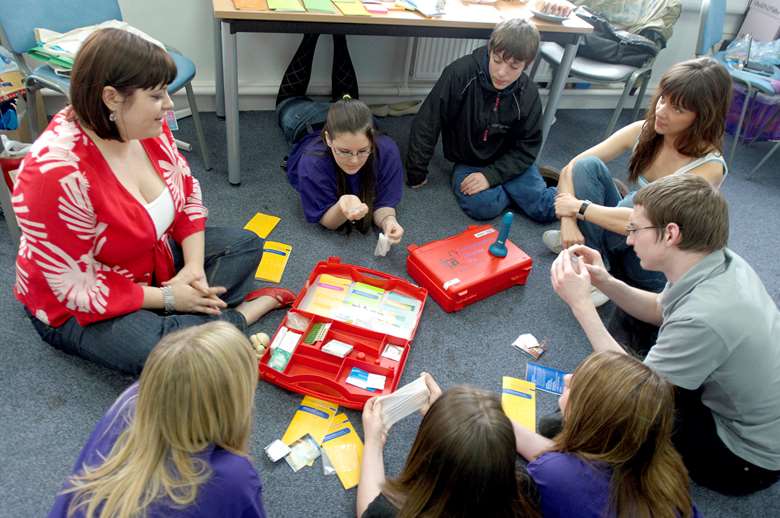Job title: Sexual health worker
Charlotte Goddard
Tuesday, May 29, 2012
Sexual health workers' roles are varied, from diagnosing diseases to safe sex advice, finds Charlotte Goddard

What is sexual health work?
Sexual health work with young people is a very wide field. On the one hand, it comprises qualified health professionals delivering clinical as well as preventative sexual health services to young people and older people; and on the other, trained youth workers delivering sexual health messages as part of their youth work activity.
There is a variety of job titles that cover work in hospitals, NHS clinics, clinics run by voluntary organisations, youth projects, youth centres and schools. Sexual health advisers, for example, work in Departments of Genitourinary Medicine (GUM Clinics) in the UK and Ireland, while sexual health development workers often have more of an outreach role.
Sexual health workers in different roles could be diagnosing sexually transmitted diseases, supporting young people who have sexually transmitted diseases, developing and delivering safe sex education programmes for schools and youth clubs, or delivering contraceptive and pregnancy testing programmes.
What qualifications are required?
There is no specific qualification that is required for sexual health work. Gill Bell, nurse consultant sexual health adviser at Royal Hallamshire Hospital, says: “There are unqualified routes in, particularly in the voluntary sector where you can start as a volunteer or as a paid outreach worker. But I would say to anyone who wants to go into sexual health work, to protect their career prospects, they should get a transferable qualification that makes them part of a professional body, such as a nursing or social work qualification, or a youth work qualification.”
FPA offers a range of non-clinical courses in England, Scotland, Wales and Northern Ireland, including a number of courses on working with young people such as core competencies in sexual health for youth workers, confidentiality, sex, the law and young people, and delivering sex and relationships education with confidence. Some courses are university-accredited.
What skills are needed?
Sexual health workers need personal qualities of compassion and empathy, and a non-judgmental and supportive attitude, as well as excellent communication skills. “You need an ability to connect with young people but also to have good boundaries,” says Bell. “You need to be able to take on responsibility for quite challenging decisions, but you also need organisational skills.”
What is the pay like?
For sexual health work in general, there is a wide range of salaries. Sexual health advisers tend to be on NHS nursing salary band 6 (£25,528 to £34,189) or 7 (£30,460 to £40,157), although they are occasionally higher.
What are the rewards and challenges of the job?
Talking about her role as a sexual health adviser, Bell says: “It is a brilliant, varied job, so it allows you to use a very wide range of skills. It is challenging in that you come across situations that are distressing, and you have to be able to talk those issues through with a supervisor. There are sometimes difficult ethical issues, for example around child protection and confidentiality.”
What is the state of the job market?
There have been many cuts in the voluntary sector as grants dry up for charities such as FPA and Brook, which are delivering sexual health services. In the statutory health sector too, preventative work like sexual health education is more likely to face cuts in times of hardship than work with people who are already sick. Job descriptions are also widening. Gill Bell says that in the statutory sector, sexual health advisers are being asked to take on more aspects of healthcare.
How is this sector being affected by current policy?
As in many sectors, the onus is being put on local authorities to commission “comprehensive sexual health services”, including testing and treatment for sexually transmitted infections, contraception outside of the GP contract, termination of pregnancy, and sexual health promotion and prevention, although the NHS will continue to commission HIV treatment alongside its responsibilities for commissioning treatment for other infectious diseases. There has been some concern in the sector that prevention work, commissioned by local authorities, will become isolated from treatment services commissioned by the NHS.
Find out more
- Sexual health charity FPA has a professionals section of its website that features factsheets, resources and details of training courses. www.fpa.org.uk
- The British Association for Sexual Heath and HIV is the professional representative body for those in the UK working in sexual health including the management of STIs and HIV. www.bashh.org
- The Society of Sexual Health Advisers is a UK-wide organisation. It provides an opportunity for members to meet and work towards further professional development. www.ssha.info
- Brook, the UK’s largest young people’s sexual health charity has a section for professionals on its website, including resources for working with young people. www.brook.org.uk




